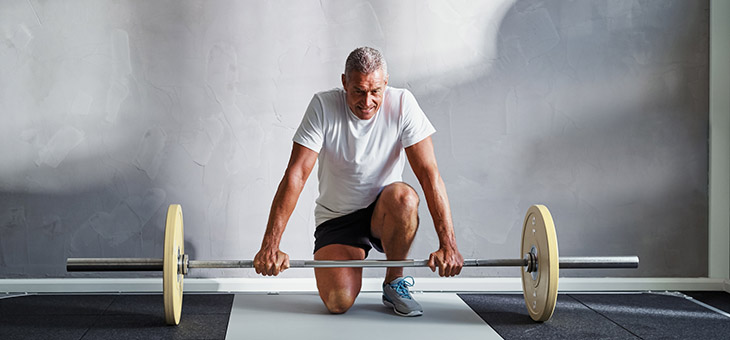If you’re to believe what you see on social media, only the young and super fit lift weights. This, unfortunately, may deter older people from strength training, which isn’t great news – particularly in light of new research.
A study published in the British Journal of General Practice by scientists from University College Dublin found: “A combination of muscle strength training and protein supplementation was the most effective intervention to delay or reverse frailty.”
Frailty is related to the ageing process and is when our bodies decline – for example, when we become more vulnerable to small health problems such as minor infections. People living with severe frailty have over a four times greater annual risk for future hospitalisation, care home admission or death. Age UK says that around 10 per cent of over 65s are frail, and it increases to 65 per cent for those over 90.
This study recommends weightlifting and protein supplements to delay or reverse the effects that often come with ageing. If you’re a newbie to muscle strength training and a bit older than the average Instagram influencer, here are the dos and don’ts of what you should be doing in the gym – according to Cameron Lane, strength and conditioning coach at Pure Sports Medicine.
Do: prepare properly
“Strength training should be prescribed and supervised by a suitably qualified and experienced coach, trainer or instructor,” Mr Lane explains.
Making sure you know what you’re doing and your body is ready to start strength training is key before you start lifting weights. Mr Lane also recommends those with prior health issues, such as high blood pressure, undergo a medical screening beforehand. The more prepared you are for weightlifting, the less likely you are to injure yourself.
Don’t: jump around too much
Mr Lane warns against “repeated high-intensity jumping and landing exercises”. The older you are, the more careful you have to be with your body, so you have to evaluate with each exercise whether it is pushing you too hard.
“An appropriate level of high-intensity jumping and landing has been shown to have a positive influence on bone-related health issues such as osteoporosis, however, too much can possibly lead to injury,” Mr Lane says.
Do: start at the bottom
This really applies to anyone lifting weights for the first time – don’t go too heavy and hard immediately, because you could injure yourself, and this risk is greater for the elderly.
“Training should have an appropriate starting level,” says Mr Lane. “Exercises should be selected based on a systematic progression.” This could mean upgrading from stable to unstable movements, or from static to dynamic exercises. Start small, then you can build your way up as you become more comfortable and confident.
Don’t: stay at the same level
It’s important not to get into a lifting rut, because if your training plateaus, you’re unlikely to see much of a benefit to your body. Whether this is upgrading the movements as explained above or increasing the weight you’re lifting, you should be constantly making things harder for yourself.
“To continue seeing improvements from exercise, the sessions and exercises must gradually become more challenging once the client has achieved an appropriate level of competency,” Mr Lane says.
Do: include balance training
For older people, Mr Lane recommends supplementing strength training with balance-based exercises. “There is large evidence that shows balance training reduces the risk of falls in the elderly population,” he explains.
This could be as simple as balancing on one leg, or even standing on the bosu (that flat rubber ball you might recognise from the gym). Balance training is also suitable for the elderly because it’s not high impact or intensity – all you have to do is move slowly and methodically, focusing on your core.
Do you lift weights? Have you seen an improvement in your health since starting?
– With PA
If you enjoy our content, don’t keep it to yourself. Share our free eNews with your friends and encourage them to sign up.
Related articles:
https://www.yourlifechoices.com.au/health/wellbeing/fitness/feel-good-about-fitness
https://www.yourlifechoices.com.au/health/your-health/why-you-should-start-swimming-in-2021
https://www.yourlifechoices.com.au/health/your-health/health-and-ageing/study-finds-age-is-no-barrier-to-successful-weight-loss
Disclaimer: This article contains general information about health issues and is not advice. For health advice, consult your medical practitioner.

